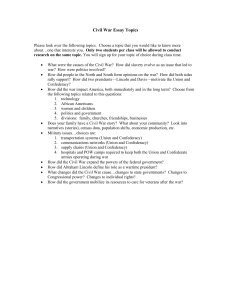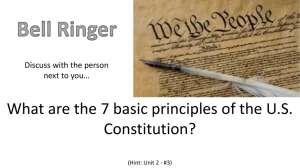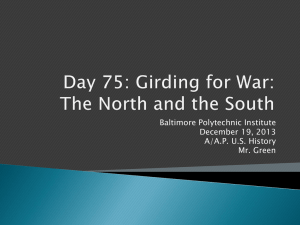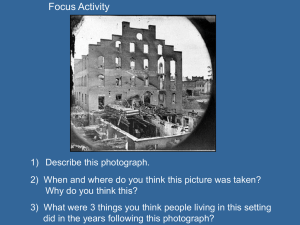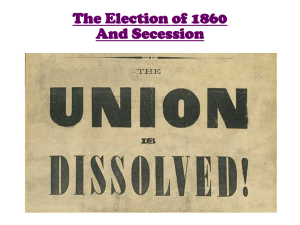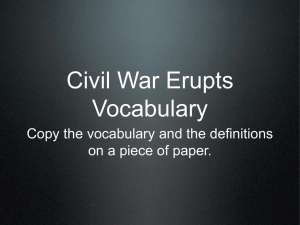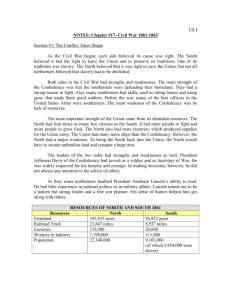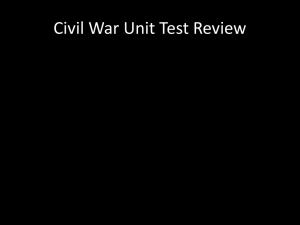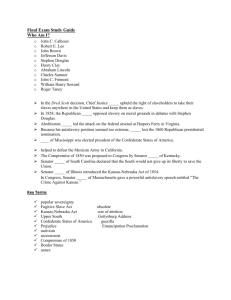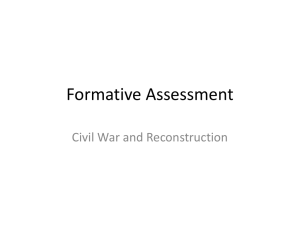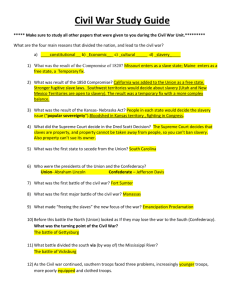Humanities-The American Experiment
advertisement
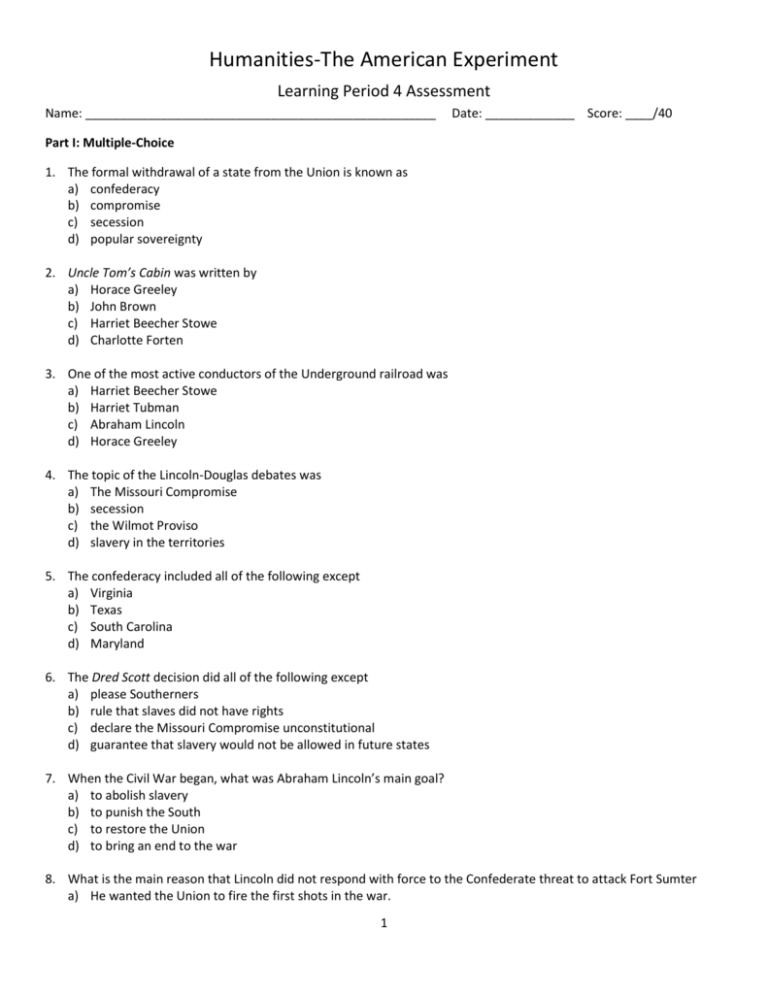
Humanities-The American Experiment Learning Period 4 Assessment Name: ___________________________________________________ Date: _____________ Score: ____/40 Part I: Multiple-Choice 1. The formal withdrawal of a state from the Union is known as a) confederacy b) compromise c) secession d) popular sovereignty 2. Uncle Tom’s Cabin was written by a) Horace Greeley b) John Brown c) Harriet Beecher Stowe d) Charlotte Forten 3. One of the most active conductors of the Underground railroad was a) Harriet Beecher Stowe b) Harriet Tubman c) Abraham Lincoln d) Horace Greeley 4. The topic of the Lincoln-Douglas debates was a) The Missouri Compromise b) secession c) the Wilmot Proviso d) slavery in the territories 5. The confederacy included all of the following except a) Virginia b) Texas c) South Carolina d) Maryland 6. The Dred Scott decision did all of the following except a) please Southerners b) rule that slaves did not have rights c) declare the Missouri Compromise unconstitutional d) guarantee that slavery would not be allowed in future states 7. When the Civil War began, what was Abraham Lincoln’s main goal? a) to abolish slavery b) to punish the South c) to restore the Union d) to bring an end to the war 8. What is the main reason that Lincoln did not respond with force to the Confederate threat to attack Fort Sumter a) He wanted the Union to fire the first shots in the war. 1 Humanities-The American Experiment Learning Period 4 Assessment b) He wished to treat the Confederacy as a legitimate nation. c) He did not want to anger Republicans and slave states still in the Union. d) He had decided to abandon Fort Sumter. 9. Which of the following is not an important advantage of the ironclad ships a) They could resist burning. b) They could withstand cannon fire. c) They could splinter wooden ships. d) They could travel much faster than other ships 10. What was the stated aim of the Emancipation Proclamation a) to free all slaves in the United States b) to free slaves behind Confederate lines c) to free slaves in Union slave states d) to enlist slaves in the union army Part II: Matching (Not all answers from the Answer Bank are used.) Answer Bank: Fugitive Slave Act, Wilmot Proviso, secession, Compromise of 1850, Stephen A. Douglas, Underground Railroad, John Brown, Free-Soil Party, Republican Party, Know-Nothing Party, Abraham Lincoln, Jefferson Davis, Thirteenth Amendment, Emancipation Proclamation, Reconstruction, Black Codes, Fourteenth Amendment 1. ______________________The decision by a state to leave the Union 2. ______________________Abolished slavery everywhere in the United States 3. ______________________ Series of measures that were intended to settle the disagreements between the free states and slave states 4. ______________________Secret network of people who hid fugitive slaves who went north to freedom 5. ______________________Fierce opponent of slavery who led a raid that killed five proslavery people 6. ______________________Law that provided for harsh treatment for escaped slaves and for those who helped them 7. ______________________Political party formed to oppose extending slavery in the territories 8. ______________________President of the Confederate States of America 9. ______________________Order issued by Lincoln freeing slaves behind confederate lines. 10. ______________________Period of rebuilding the United States after the Civil War Part III: Matching (Not all answers from the Answer Bank are used.) Answer Bank: Fort Sumter, Gettysburg, Chancellorsville, Vicksburg, William Tecumseh Sherman, Appomattox Court House, Fort Pillow, Andersonville, Bull Run, Stonewall Jackson, George McClellan, Ulysses S. Grant, David G. Farragut, Robert E. Lee, Antietam, Monitor, Merrimack, Jefferson Davis, Abraham Lincoln, Harpers Ferry, John Wilkes Booth, Clara Barton, Shiloh, Anaconda Plan 2 Humanities-The American Experiment Learning Period 4 Assessment 1. ______________________ This called for a three-part assault on the Confederacy. 2. ______________________ This battle was the bloodiest single-day battle in U.S. History. 3. ______________________ As commander of all Union armies, he attacked the Confederate troops repeatedly, losing nearly 60,000 men in one six-week period. He kept going because he promised Lincoln, “Whatever happens, there will be no turning back.” 4. ______________________ This Confederate general earned his nickname by holding up well under stressful battle conditions. 5. ______________________ This battle, the first battle of the war, took place between inexperienced troops and resulted in a Confederate victory. 6. ______________________ Although President Lincoln decided merely to send in “food for hungry men,” President Davis decided that the war should begin here. 7. ______________________ After seizing New Orleans, this Union admiral took control of much of the lower Mississippi, helping the Union to achieve its goal of cutting the Confederacy in two. 8. ______________________ This Union general spent more time preparing the Army of the Potomac for battle and less time actually leading the army into battle than President Lincoln would have liked. 9. ______________________ This Confederate general, known for determination and unusual tactics, led a successful defense of Richmond but suffered high casualties at Antietam. 10. ______________________ This bloody battle, in which Confederate forces took Union forces by surprise, taught both sides about the necessity of sending out scouts, digging trenches, and building fortifications. 11. ______________________ The final surrender of the Confederate Army took place here. 12. ______________________ His march across Georgia created a wide path of destruction, terrorized civilians, attracted thousands of formerly enslaved persons, and destroyed the morale of white Southerners. 13. ______________________ Considered the turning point of the Civil War this three-day battle crippled the Confederacy so badly that Confederate troops would never again be able to invade a Northern state. 14. ______________________ The Confederacy won an important battle here but lost a great general when Stonewall Jackson was accidentally shot by his own troops. 15. ______________________ New weapons changed warfare in the Civil War. Ironclad ships, like this Union ship, made wooden ships obsolete. 3 Humanities-The American Experiment Learning Period 4 Assessment Part IV: Short Answer (Five Total Points) What advantages did the Union have over the confederacy when the war started? List at least three. What advantages did the Confederacy have over the Union? List at least two. 4

